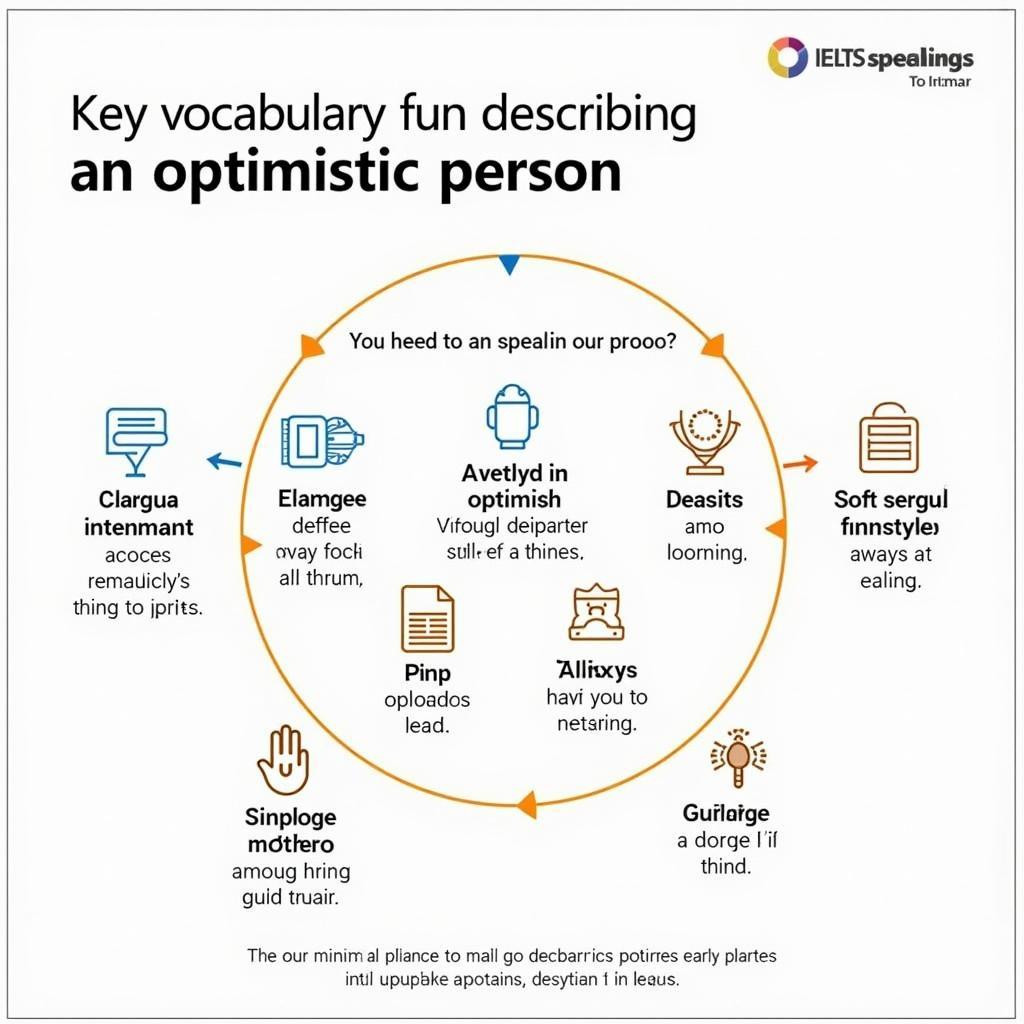In IELTS Speaking tests, candidates are often asked to describe people they know. One common topic is describing an optimistic person. This article will guide you through answering such questions effectively, helping you aim for a high band score in your IELTS Speaking exam.
Part 1: Introduction and Interview
In this section, the examiner may ask general questions about optimism. Here’s a sample question with a suggested answer:
Q: Do you consider yourself an optimistic person?
A: Generally speaking, I’d say I’m fairly optimistic. I tend to look on the bright side of situations and try to find the silver lining even when things don’t go as planned. That said, I’m also realistic and understand that challenges are a part of life. I believe in maintaining a positive outlook while being prepared for potential obstacles.
Part 2: Long Turn
Here’s a sample cue card related to describing an optimistic person:
Describe a person you know who is very optimistic.
You should say:
- Who this person is
- How you know this person
- What this person does
- And explain why you think this person is optimistic
Sample Answer (Band 6-7):
The person I’d like to talk about is my aunt, Sarah. She’s my mother’s younger sister, and I’ve known her all my life. We often meet at family gatherings and special occasions.
Sarah works as a primary school teacher, which I think suits her personality perfectly. She’s always cheerful and energetic when dealing with young children.
I consider her very optimistic because she always seems to find something positive in every situation. For example, when she faced a health issue last year, instead of getting depressed, she viewed it as an opportunity to improve her lifestyle. She started eating healthier and exercising more.
Her positive attitude is really inspiring. She often says things like “Every cloud has a silver lining” or “When one door closes, another opens.” I think her optimism comes from her belief that challenges are opportunities for growth.
Sample Answer (Band 8-9):
I’d like to shed light on my aunt Sarah, who epitomizes optimism in every sense of the word. As my mother’s younger sibling, Sarah has been an integral part of my life since my earliest memories. Our paths frequently intersect at family gatherings and milestone celebrations.
Sarah has carved out a niche for herself as a primary school teacher, a profession that dovetails perfectly with her effervescent personality. Her boundless energy and infectious enthusiasm make her an ideal mentor for young, impressionable minds.
What sets Sarah apart is her remarkable ability to find a silver lining in even the most challenging circumstances. A prime example of this was her response to a significant health setback last year. Rather than succumbing to despair, she viewed it as a catalyst for positive change, overhauling her lifestyle with a focus on nutrition and physical activity.
Her unwavering positivity is truly awe-inspiring. She often peppers her conversations with uplifting adages like “Every cloud has a silver lining” or “When one door closes, another opens.” I believe her optimism stems from a deep-seated conviction that adversities are not roadblocks, but stepping stones to personal growth and self-improvement.
 An optimistic woman smiling confidently
An optimistic woman smiling confidently
Follow-up Questions:
Q: How does this person’s optimism affect others around them?
A (Band 6-7): I think Sarah’s optimism has a positive effect on people around her. Her students love her cheerful attitude, and it helps them enjoy learning. In our family, she often cheers people up when they’re feeling down. Her positive energy is quite contagious.
A (Band 8-9): Sarah’s optimism has a profound ripple effect on those in her orbit. In the classroom, her buoyant spirit creates an environment conducive to learning, inspiring her students to approach challenges with enthusiasm. Within our family circle, she serves as a beacon of hope, lifting spirits during trying times. Her optimism is truly contagious, often catalyzing a shift in perspective for those fortunate enough to be in her presence.
Q: Do you think optimism can be learned or is it an innate trait?
A (Band 6-7): I believe optimism can be both innate and learned. Some people naturally tend to be more positive, but I think anyone can develop a more optimistic outlook with practice. It’s about changing your thought patterns and focusing on the good things in life.
A (Band 8-9): While some individuals may possess a natural predisposition towards optimism, I firmly believe that it is a mindset that can be cultivated. Optimism is not merely a fixed trait but a skill that can be honed through conscious effort and practice. It involves reframing negative thoughts, actively seeking out positive aspects in various situations, and developing resilience in the face of adversity. Through consistent cognitive restructuring and mindfulness practices, one can gradually shift their perspective towards a more optimistic outlook, regardless of their initial disposition.
Part 3: Two-way Discussion
Q: How does optimism contribute to success in life?
A (Band 6-7): I think optimism can really help people succeed in life. Optimistic people tend to keep trying even when things are difficult. They believe they can overcome challenges, which gives them more confidence. This positive attitude can also help in relationships and at work, as people generally prefer to be around positive individuals.
A (Band 8-9): Optimism plays a pivotal role in achieving success across various facets of life. It serves as a powerful catalyst for perseverance, enabling individuals to view setbacks as temporary hurdles rather than insurmountable obstacles. This resilient mindset fosters a proactive approach to problem-solving and cultivates innovative thinking. Moreover, optimism enhances interpersonal relationships and professional dynamics, as it breeds confidence and attracts positive energy. In the workplace, optimistic individuals often exhibit higher levels of engagement and productivity, contributing to a more vibrant and effective team environment. Ultimately, optimism acts as a self-fulfilling prophecy, where positive expectations increase the likelihood of favorable outcomes.
 Optimistic person overcoming challenges
Optimistic person overcoming challenges
Q: Can too much optimism be detrimental?
A (Band 6-7): Yes, I think too much optimism can sometimes be a problem. If someone is overly optimistic, they might ignore real risks or problems. This could lead to poor decision-making or not being prepared for difficulties. It’s important to have a balanced view and be realistic while still maintaining a positive outlook.
A (Band 8-9): While optimism is generally beneficial, an excess of it can indeed be counterproductive. Unbridled optimism, often termed as ‘blind optimism’, can lead to a distorted perception of reality. This may result in underestimating risks, overlooking potential pitfalls, or failing to adequately prepare for challenges. Such an overly rosy outlook can impair critical thinking and sound decision-making processes. It’s crucial to strike a balance between optimism and realism, fostering what psychologists call ‘realistic optimism’. This approach combines a positive outlook with a pragmatic assessment of situations, allowing individuals to harness the benefits of optimism while maintaining a grounded perspective on potential obstacles and limitations.
Key Vocabulary and Phrases for High Scores
-
Epitomize /ɪˈpɪtəmaɪz/ (verb): To be a perfect example of something.
Example: “My aunt Sarah epitomizes optimism in every aspect of her life.” -
Infectious /ɪnˈfekʃəs/ (adjective): Likely to spread to and affect others.
Example: “Her infectious enthusiasm motivates everyone around her.” -
Silver lining /ˈsɪlvər ˈlaɪnɪŋ/ (idiom): A positive aspect in an otherwise negative situation.
Example: “She always manages to find a silver lining in every cloud.” -
Catalyst /ˈkætəlɪst/ (noun): Something that causes an important event to happen.
Example: “Her optimism acted as a catalyst for positive change in the community.” -
Profound /prəˈfaʊnd/ (adjective): Very great or intense.
Example: “Her optimism has a profound impact on those around her.”
 Key vocabulary for IELTS Speaking
Key vocabulary for IELTS Speaking
Examiner’s Advice
To score high in the IELTS Speaking test when describing an optimistic person:
- Use a variety of descriptive vocabulary and idiomatic expressions.
- Provide specific examples to illustrate the person’s optimistic nature.
- Discuss the impact of their optimism on others and themselves.
- Reflect on the broader implications of optimism in society.
- Practice speaking fluently and coherently about the topic.
Remember, the key to success in IELTS Speaking is not just about what you say, but how you say it. Confidence, fluency, and the ability to express your ideas clearly are crucial factors in achieving a high band score.


